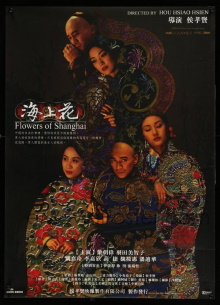
Onwards as we move through the filmography of Hou Hsiao-hsien, we have this exquisitely crafted Flowers of Shanghai. My wife recounted to me how she’d tried to watch this multiple times over the years but failed to finish it every time. The reason is that the predominant language used in the film is Shanghainese which made it quite incomprehensible. But this time, we watched it all the way to the end, thanks to the power of English subtitles.
This film recounts the stories of several so-called flower girls, essentially high-class courtesans, who operate out of fancily-appointed brothels in Shanghai in the late 19th century. Each of them has their own set of servants and actually have long term relationships with wealthy patrons. One such example is Master Wang and Crimson. Wang has been Crimson’s main patron for some years now and has even asked her to marry him but she seems reluctant to commit and Wang has started seeing another girl Jasmin. Another story concerns the shrewd Emerald who makes careful plans to buy her own freedom from the Auntie who raised her, taking into account the value of the jewellery and clothes she has accumulated through her years working there. The film freely flits between these small stories while at the same time showing the wealthy patrons socializing and enjoying themselves within these private enclaves.
This is an exquisitely beautiful film even as it deliberately restricts itself to within the confines of these flower houses without so much as a hint of the world outside. Every detail such the dense patterns and vivid colors of the dresses, their hairpins and jewellery, the decor and furniture, simply screams luxury and decadence. Everything feels so authentic that it’s satisfying simply to watch Tony Liu as Master Wang make use of the various implements used to smoke opium as if it were second nature. In addition, there are also the background details on the society of the era, how the flower houses buy up girls at a young age to train them, how the relationships between the girls and their aunties work, how the wealthy men expect to be served and so on. It feels almost like a documentary about these flower houses especially with Hou’s usual style of keeping the camera at a distance from the characters so that we take in the whole scene at once.
At the same time as we shift from scene to scene and flit between the various characters, it’s hard to say that there is any emotional core to the film at all. We only ever see bits and pieces of each of the stories and even then only the parts that play out within the flower houses. One of the more dramatic of the stories involves one of the girls trying to poison her patron due to his breaking a promise but that comes late in the film and from out of nowhere. There’s very little expectation of the audience being emotionally engaged in the goings-on or even have much sympathy for lives of the flower girls. The intent seems to be simply present a kind of lifestyle that is a world and an era apart from us in a more or less neutral manner.
Overall this is another amazing film by Hou Hsiao-hsien but I’m puzzled by critics who call this one of his greatest films. It’s clear that he is perhaps at the peak of his technical skills making this but we can also tell that he has less of a personal connection to this film than his previous ones about Taiwan itself. It doesn’t seem to me that he has anything of his own that he wants to say here and that’s why I could never call this one of his best films.